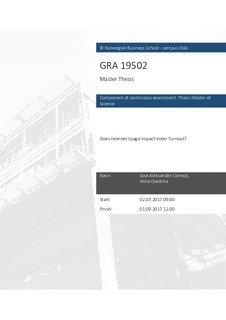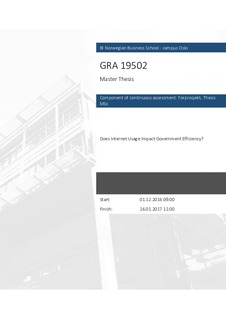| dc.contributor.author | Cornejo, Jose Aleksander | |
| dc.contributor.author | Osadcha, Alina | |
| dc.date.accessioned | 2018-03-01T10:38:42Z | |
| dc.date.available | 2018-03-01T10:38:42Z | |
| dc.date.issued | 2017 | |
| dc.identifier.uri | http://hdl.handle.net/11250/2487909 | |
| dc.description | Masteroppgave(MSc) in Master of Science in Business, Economics - Handelshøyskolen BI, 2017 | nb_NO |
| dc.description.abstract | This master thesis explores the effect of internet usage on political
participation and voters’ political preferences, as measured by voter turnout and
party vote shares. We conduct a two-stage least squares analysis within a fixed
effects framework. The main results suggest a positive and significant effect of
internet usage on voter turnout. The subsequent findings indicate a positive and
significant effect of internet usage on vote shares of small parties and local list
candidates, which do not belong to either left-wing or right-wing party blocs.
However, placebo tests suggest that the identification strategy may not be the best
fit for the voter turnout data. The results for political participation may be biased
by the correlation between the instrument variable and underlying municipalityspecific
trends in the voter turnout. The bias does not appear to be present in the
data for vote shares of small parties and local lists. A reasonable interpretation of
these findings is that the internet roll-out programme of 2001 to 2008 was
particularly beneficial in bringing attention to political parties of smaller size and
individual politicians. | nb_NO |
| dc.language.iso | eng | nb_NO |
| dc.publisher | BI Norwegian Business School | nb_NO |
| dc.subject | samfunnsøkonomi | nb_NO |
| dc.subject | economics | nb_NO |
| dc.title | Does internet usage impact voter turnout? | nb_NO |
| dc.type | Master thesis | nb_NO |

